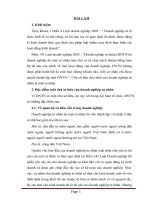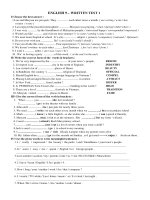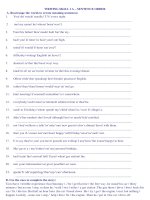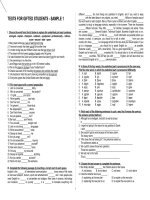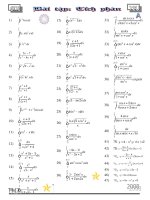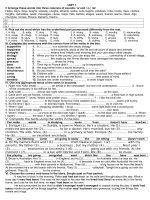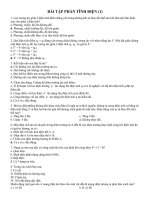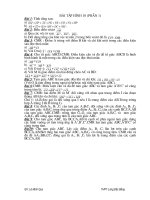bai tap English 9Unit 1
Bạn đang xem bản rút gọn của tài liệu. Xem và tải ngay bản đầy đủ của tài liệu tại đây (123.2 KB, 9 trang )
<span class='text_page_counter'>(1)</span><div class='page_container' data-page=1>
<b>E9 U1 (1)</b> <b>EXERCISES</b>
<b>I.Write the sentences beginning “I wish”:</b>
1.I don’t know many people in the town.
………..
2. It would be nice to be able to fly a plane.
………..
3. It’s a shame I don’t have a key.
………..
4. Ann isn’t here and I need to see her.
………..
5. I don’t like being so short.
………..
6. Unfortunately, I have to work tomorrow.
………..
7. Don’t shout all the time. It’s so annoying.
………..
8. I’m sorry I can’t go to the party.
………..
9. I’d like to get access to the internet, but I don’t have a computer.
………..
10. It’s pity the weather isn’t better today.
………..
<b>II. Choose the correct word for these sentences:</b>
1.It’s was a boring weekend, I(did, don’t do, didn’t do, would do)
anything.
2.Lan and Mary are pen pals. They (are writing, write, has written,
<b>wrote) each other twice a month.</b>
3.Lan enjoyed the peaceful atmosphere ( when during while, where)
Mary was praying.
4.I was very (impressed, comprised, corresponded, interested) by the
efficiency of the staff.
5.I rarely eat ice cream now but I (eat, used to eat, am eating, has
<b>eaten) it when I was a child.</b>
6.Nam wishes he ( can lend, would lend, could lend, lend) Thanh some
money for her rent, but has broken himself.
7.Would you like (to come, coming, came, come) and visit me next
summer?
8.We must learn English at school. It’s a(n) (primary, compulsory,
<b>national, optional).</b>
<b>III.Make questions for these answers:</b>
1.Last vacation I went to see my pen pal Lan.
………..
2.She lives in HaNoi, Viet Nam.
………..
3.We have been pen pals for two years.
………..
4.We did a lot of sightseeing and visited some interesting places in HaNoi.
………..
5.Yes, of course. I visited Ho Chi Minh mausoleum twice.
………..
6.HaNoi is quite old and peaceful. I was really impressed by the beauty of
the city.
………..
<b>III. Read the letter. Then answer the questions:</b>
Dear Mai,
I’m very pleased that we are going to be pen pals. I’ll tell you a
little about myself, and you can do the same when you write to me.
I live in an area of LonDon called Maida Vale. It’s quite near the
center, but there are parks nearby where I often take my dog, Mickey, for a
walk, I live with my parents and my younger brother, Paul. My father
works for the post office and my mother has a part - time job as a nurse.
I go to the local comprehensive school, where I have a lot of
friends. I like most subjects, but not all of them! In the evening I sometimes
visit friend or stay at home and listen to music, and at the weekends I like
going swimming or horse - riding.
At the moment I’m working very hard because I have exams soon,
so I’m spending a lot of time in the library!
I am looking to hearing from you. Write soon!
Best wishes,
Mary
1.What is Mai’s pen pal’s name?
………..
2.Where does she live?
………..
3.Who does she live with?
………..
4.What do her parents do?
………..
5.What school does she go to?
………..
6.What are her hobbies?
</div>
<span class='text_page_counter'>(2)</span><div class='page_container' data-page=2>
<b>E9 U1 (2)</b> <b>EXERCISES</b>
<b>I.Choose the word whose main stress is placed different from the</b>
<b>others:</b>
1. a. climate b. comprise c. impress d. farewell
2. a. divide b. puppet c. ethnic d. notice
3. a. primary b. religion c. optional d. separate
4. a. friendliness b. primary c. tropical d. correspond
5. a. monster b. abroad c. depend d. instruct
<b>II. Choose the best answer for these sentences:</b>
1. “Are Alice and Tom still living in New York?”
“No, they ( are just moved, had just moved, have just moved, will
<b>just move) to Dallas.”</b>
2. “Where is the new stove that you bought yesterday?”
“ The color didn’t match, so I (return, had returned, returned, did
<b>return) it to the store.”</b>
3.You and Carl seem to be getting along well.”
“Yes, I (like, liking, liked, hate liked) him better than before.
4.”How are you feeling?” – “ I have been feeling better since the doctor
<b>(has came, will come, had come, came).”</b>
5.I (have known, has known, knew, has knowed) since he was a child.
6.That famous book (comprises, consists, makes, has) of five chapters.
7. The (city, capital, town, district) of the U.S state of Utah is Salt Lake
City.
8. “What is the (current, population, territory, currency) of
Thailand ?” “The bath.”
9. The city has a(n) ( atmosphere, population, climate, capital) of
around 19.000.000.
10. The units (are separated, separate, separated, separating) into the
following areas: listening, speaking, reading and writing.
11. People aged 65 and over now (comprise, contain, consist, combine)
nearly 20% of the population.
12. Mexico is famous for its hot (climate, area, industry, red) and spicy
food.
13. “How long have you been with the company?”
“I (will work, was working, worked, have worked) there for 2 years.”
14. The teacher(shared,turned,changed,divided)the class into groups of
3.
15. He was so ( shocked, impressed, admiring, surprised) by Cindy’s
singing that he asked her to sing on the radio.
16. She still (denies, depends, deposit, desert) on her parents because
she hasn’t got a job.
17. School is (compose, compromise, compulsory, comfort) for all
children between the ages of five and sixteen.
18. I wish Beth (would stop, will stop, stops, stop) trying to be so nice.
19. All students must learn English, but German is (option, optional,
<b>opportunity, opposition).</b>
20. Coffee will not grow (in, on, at, with) a cold climate.
<b>III. Read the following passage and choose the best answers:</b>
Every nation and every country has its own customs and traditions.
In Britain traditions play a more important part in the life of the people than
in other countries. English men are proud of their traditions and carefully
keep them up.
It has been the law for about 300 years that all theaters are closed on
Sundays. No letters are delivered; only a few Sunday papers are published.
To this day an English family prefers a house with a garden to a flat
in a modern house with central heating. English people like gardens.
Sometimes the garden in front of the house is a little square covered with
cement painted garden in imitation of grass and a box of flowers.
Holidays are especially rich in old traditions and are different in
Scotland, Ireland, Wales and England. Christmas is a great English national
holiday, and in Scotland it is not kept, except by clerks in banks, all shops
and factories are working.
<b>1.What is the best title for the passage?</b>
a. Traditions and customs in Great Britain.
b. The importance of Traditions and Customs.
c. Traditional life vs. Modern life.
d. English’s men hobbies.
<b>2.How important are traditions in Britain?</b>
a. It’s slightly important.
b. it’s more important than in other countries.
c. It’s rather important.
d. It’s somewhat important.
<b>3.In Great Britain, ………..</b>
a. only a few papers are published.
b. a garden in front of the house is a little square covered with cement
painted garden in imitation of grass and a box of flowers.
c. all shops and factories are working at Christmas.
d. traditions are preserved.
4.The word “it” in the last paragraph refers to …………..
</div>
<span class='text_page_counter'>(3)</span><div class='page_container' data-page=3>
<b>E9 U1 (8 )</b> <b>EXERCISES</b>
<b>I. Supply the correct tenses:</b>
1. Mary ……… (wash) the dishes every night.
2. She……… (not take) them at the moment.
3. Her sister ………. ( not take) sugar in her tea.
4. Daisy ……….. (just / wash ) the cups. Now they are clean.
5. He ………. ( not see ) her since yesterday.
6. ……… (you go)……….. to the cinema last night?
7. ………. ( you see)…………. a good film lately?
8. Where is John ? He ……….. ( play) tennis.
9. When I last ………. (see) her, she ………. (live) in Hue.
<b>II.Put the verbs in brackets into the correct form:(V-ing or To V0)</b>
1. Would you like ……… (come) with us while you’re in town ?
2. Would you mind ………(open) the window ?
3. He’s going ………. (sell) his house.
4. We’re looking forward to ……….. (see) you in July.
5. It’s nice ………(meet) you, Marry.
6. I’d like ……….. (sit) with your brother.
7. It’s great ………(be) in Viet Nam.
8. I don’t want ……….……. (go) there.
9. She is trying ………..(pick) it up.
10. Tom likes ……….. (swim).
<b>III. Put the verbs into correct tense ( past simple or present perfect ):</b>
1. Columbus --- ( discover) America more than 450 years ago.
2. I ………(not see) you for more than a week.
3. We ……….. (not eat) meat since last month.
4. Since when ………..(be) the last war?
5. How long ago ……… (be) the last war?
6. Old George ………. (not be) here for year !
7. They ………(come) here a month ago.
8. He ………..(not speak) to me for over three weeks.
9. How long ago ………..(you arrive) here?
10. She ……… (not have) a holiday for four years.
<b>IV. Complete the following sentences with proper prepositions:</b>
1. I am living --- my parents in Ho Chi Minh city.
2. Robert is --- France.
3. Last week I took my brothers --- the zoo.
4. I depend --- the radio for news.
5. That country is divided --- two regions.
6. The capital --- England is London.
7. My sister is interested --- music.
8. Mary’s dress is different --- my sister’s.
9. We walk --- the History Museum every day.
10. My brother is fond --- ice-cream.
<b>V. Turn the following sentences into the passive voice:</b>
Ex: The beauty of the city really impressed Maryam.
<sub></sub> Maryam was really impressed by the beauty of the city.
1. Mary washed the dishes every day.
2. People speak English in the United States.
3. Peter painted the doors yesterday.
4. Farmer Lum has just planted some trees.
5. People will forget this play in a few years’ time.
<b>VI. Build a complete sentence with the given words:</b>
Ex: It / seem / difficult / me / have / trip / abroad
<sub></sub> It seems difficult for me to have a trip abroad
1. Would / like / come / visit / us / next week?
………
2. Wish / I / have / enough money / buy / bicycle.
……….
3. Mary / used / walk / school / when / young.
………
4. It / so nice / sit / here / you.
……….
5. They / not write / each other / two years.
……….
<b>VII. Rewrite the following sentences without changing their meanings.</b>
1. Maryam lives in Kuala Lumpur.
Maryam is ………..
2. Lan and Maryam began writing to each other two years ago.
Lan and Maryam have been………...
3. The beauty of Hoan Kiem Lake impressed Maryam
Maryam ………
4. Lan doesn’t walk past the mosque any more.
Lan used ………
5. The girl visited the Temple of Literature.
</div>
<span class='text_page_counter'>(4)</span><div class='page_container' data-page=4>
<b>E9 U1 ( 8, 3, 11, 9, 4 )</b> <b>EXERCISES </b>
<b>I. From each number, pick out one word whose underlined part is</b>
<b>pronounced differently from the others</b>
1. A. out B. round C. about D. would
2. A. chair B. check C. machine D. child
3. A. too B. soon C. good D. food
4. A. though B. enough C. cough D. rough
5. A. happy B. hour C. high D. hotel
6. A. bill B. lively C. sin D. mineral
7. A. colour B.hole C.go D. toe
8. A. so B. coat C. note D. bottom
<b>II. From each number , pick out one word which has the stress on the</b>
<b>FIRST syllable</b>
1. A. region B. comprise C. Malaysia D. compulsory
2. A. association B. Buddhism C. divide D. together
3. A. enjoy B. religion C. Hinduism D. population
4. A. Chinese B. although C. instruction D. currency
<b>II. Choose the word, phrase or sentence that best complete each</b>
<b>unfinished sentence below or that best keeps the meaning of the</b>
<b>original sentence if it is substituted for the underlined word or</b>
<b>phrase</b>
1. (As, Such as, Like, Similar) Kuala Lumpur, HN is a busy modern
city.
2. The (famine, strike, capitalism, earthquake) destroyed the Central
Bank.
3. I reserved (set, bought, booked, put) a table for two, at eight o’clock.
4. Football, chess and tennis are (matches, games, plays, athletics).
5. The manager (insisted, suggested, demanded, ordered) the men to
return to work immediately.
6. I wish I (knew, know, will know, would know) his name.
7. If you have a map along, you (will, will not, wouldn’t would) get lost.
8. I told her she could stay with us. That’s what I (said to her, said her,
<b>told to her, told).</b>
9. He told me he couldn’t go to sleep. That’s what he <b>(said me, talked to</b>
<b>me, told to me, said to me).</b>
10. The English student acts as if he (knows, knew, had known, will
<b>know) Vietnamese perfectly.</b>
11. Over the next few days, the girls (will visit , visited , are visiting,
<b>visits) Ho Chi Minh’s Mausoleum. </b>
12. When did you (recently, already, last, lately) see him?
13. The car went (with, for, to, at) full speed.
14. Let’s have dinner, (will he, shall we, won’t we, shan’t we) ?
15. The earth is a(n) (satellite, state, planet, star)
16. I borrowed this coat ( at, to, from, by) my farther.
17. If you need an extra bed for your guest, you can use one of (our, us,
<b>ours, of us).</b>
18. We went by car but the children went ( on, by, to, with) foot.
19. Buddhism is a(n) ( group, religion, association, imagination).
20. Lan (enjoying, has enjoyed, enjoyed, enjoys) the peaceful atmosphere
while Maryam was praying.
21. I wish I (can lend , would, lend, could lend, will lend) you some
money for your rent, but I’m broke myself.
22. There are several books by Hemingway on this ( shelf, platform ,
<b>cupboard, support)</b>
23. I was so tired that I (got,felt, went, fell) asleep in the chair.
24. The players (told, were told, have told, tell) to be there at 3 o’clock.
25. Do you (let me, permit that I, mind if I, allow me) say this in class?
26. I was having a rest when the volcano (exhibited, exhausted, exhaled,
<b>erupted).</b>
27. We (are doing, have done, did, all are correct) an English exercise.
28. He (used to, used, use, use to ) wear a pair of glasses.
29. They wanted to know if the woman had died of the rare (illness, pain,
<b>ache, hurt) </b>
30. “I wish you (could stay, will stay, stay, can stay) longer”, Lan said to
Maryam at the end of the week.
<b>II. Rewrite each sentence, beginning as shown, so that the meaning</b>
<b>stays the same:</b>
1. John smoked a lot a year ago, but now he doesn’t smoke any more.
John used ………
2. It’s time for you to go to school.
It’s time you………
3. How long is it since you saw Tom?
When………
4. Please keep silent in the classroom.
I’d rather you………..
5. He can’t pass the examination.
He wishes ……….
6. We can’t go out because of heavy rain.
We wish……….
7. I don’t like you to come to class late.
</div>
<span class='text_page_counter'>(5)</span><div class='page_container' data-page=5>
<b>E9 U1 (3)</b> <b>EXERCISES </b>
1. How much time did you (spend, bring, pass, give) on your
homework?
2. Maryam had a good time last summer.(enjoyed herself, had plenty of
<b>time, had enough time, had a useful time).</b>
3. I didn’t ( take, catch, size, pick) what you said.
4. The crowd suddenly grew quiet.( increased, began, became,
<b>behaved)</b>
5. What is your age ? Are you twenty years old yet? ( How tall are you?,
<b>Where are you from?, How much do you weigh, How old are you?)</b>
6. Would you like some coffee?( Yes, I would, Yes, I like, yes, I would
<b>like, Yes, please)</b>
7. If you (be, were, was, are) not here, where would you like to be?
8. I have lived here ( since, in, for, no preposition is needed) 2004
9. When (do you last see, were you last see, were you last seeing, did
<b>you last see).</b>
10. Maryam (has wanted invite, wanted invite, wants inviting, wanted
<b>to invite)</b>
11. Have you been to Ho Chi Minh city? ( Until you not, Already not,
<b>Still not, Not yet)</b>
22. Maryam asked (someone to, in case someone, so someone to, so
<b>that someone) let her in.</b>
13. Some more money was sent to Sam . Sam (sent, has sent, was sent,
<b>had sent) some more money.</b>
14. I’m sorry I (can’t , couldn’t, am not able to, don’t) see you
yesterday.
15. I’ve got a new grammar book.( How many cost?, How many price?,
<b>How much is it?, How much you pay?)</b>
16. What (did happen, was happened, happening, happened) to Lan
and her pen pal?
17. What make of radio is it? ( brand, manufacture, mark, sign)
18. Bread, cake and potatoes are ( vegetables, meals, cooking, food).
19. She ( lost, failed, fell down, didn’t make) her exam and had to leave
Kuala Lumpur.
20. The capital of (Indonesia, Singapore, Malaysia, the Philippines ) is
Kuala Lumpur and it is also the largest city of the country.
21. “How big is your family?” ( We are seven, It is seven people, There
<b>are seven of us, We have seven people)</b>
22. I tried (catching, catch, to catch, catch up) the bus, but I missed it.
23. Although I tried my best, I was ( late very much, ten-minute late,
<b>ten minutes late, not late) for the interview.</b>
24. She was arrested . She (escaped, was caught, was stopped, was seen)
25. She (directed, imitated, listed, edited) the articles she was going to
buy.
26. Maryam wasn’t thirsty (although, though, while, because) she had
drunk some milk.
27. I feel as if I (were, was, have, had) floating on clouds.
28. He has two children and he loves (them both, all of them, them each,
<b>everyone of them) .</b>
29. She went to the airport to see me off. ( look for me, meet me, greet
<b>me, say goodbye to me)</b>
30. English, Chinese, and Tamil are also (primary, primarily, wide,
<b>widely) spoken.</b>
31. We (passed, made, had, spent) a good holiday last year.
32. After finishing primary school, my younger brother went to
<b>(elementary school, high school, kindergarten, university) </b>
33. “I don’t go out much nowadays”. ( I don’t too, I don’t either, Me too,
<b>I don’t neither).</b>
34. We (have lived, were living, use to live, lived) in this village ten years
ago.
35. He found learning to drive easy and (sat, succeeded, passed, made) his
driving test the very first time.
36. “I have passed all my examinations!”(My dear!, Best wishes!, Well
<b>done!, That’s very well!)</b>
37. (There is, There wasn’t, There was, There were) ten people waiting
for the bus.
38. The show was dull. It was (disinterested, uninterested, interesting,
<b>uninteresting) </b>
39. “Did you see anyone interesting at the party?”
“Yes, (some of Maryam’s friends, some friend of Maryam’s, some of
<b>Maryam’s friend , some of Maryam friends ) were there”.</b>
40. I don’t feel (with, in, like, to) dancing.
41. I see that you did well at high school. Why (didn’t you go, aren’t you
<b>going, haven’t you gone, not you went) to university when you left?</b>
42. (Did they have, Had they, Must they, Have they) to speak Malay to
him?
43. Lan is (an old friend of mine, an old my friend, a my old friend, an
<b>old friend of me) </b>
44. Nobody has come to see us since we (have been living, lived, are
<b>living, had lived) in our new house.</b>
</div>
<span class='text_page_counter'>(6)</span><div class='page_container' data-page=6>
<b>E9 U1 (3, 11) EXERCISES</b> <b> </b>
<b>I. Fill each of the blanks with ONE most suitable word. For each</b>
<b>question, indicate the letter A, B, C or D against the number of the</b>
<b>question</b>
The (1)--- of Malaysia is Kuala Lumpur and it is (2)
--- the largest city (3)--- the country. The population in
2001(4)---over 22 million. Islam is the country’s official (5)---. In addition,
there are (6) --- religions such as Buddhism and Hinduism. The
national (7) --- is Bahasa Malaysia (also known simply as
Malay). English, Chinese, and Tamil are also (8)--- spoken. The
(9)--- of instruction for primary (10) --- children is
Bahasa Malaysia, Chinese, or Tamil. Bahasa Malaysia is the primary
language of instruction in (11) --- secondary schools,
(12)---some students may continue (13)--- in Chinese or Tamil. And
English (14) --- a compulsory second (15)---.
1. A. country B. capital C. city D. village
2. A. also B. both C. either D. neither
3. A. with B. at C. in D. for
4. A. is B. are C. were D. was
5. A. population B. religion C. region D. area
6. A. another B. outside C. more D. other
7. A. language B. religion C. instruction D. region
8. A. widely B. openly C. closely D. compulsorily
9. A. member B. currency C. language D. people
10. A. pupil B. student C. citizen D. school
11. A. all B. little C. much D. more
12. A. however B. although C. despite D. but
13. A. helping B. doing C. learning D. working
14. A. are B. was C. were D. is
15. A. language B. nation C. region D. religion.
<b>II. Write sentences with “I wish---“</b>
1. My friend can’t come. I
2. I’m not at home right now.
I
3. It isn’t Sunday. I
4. I don’t know how to swim.
I
5. Lan doesn’t have a good job.
Lan wishes
6. I can’t speak Tamil.
I
7. Mr. Brown doesn’t have a car.
Mr. Brown wishes
8. I have a cold. I
9. Maryam can’t find a good bike.
Maryam
10. I don’t have a house.
I
<b>wish---III. Choose A, B, C or D to complete the following sentences:</b>
1. Malaysia is divided (to, on, in, into) two regions .
2. She often goes to the (church, pagoda, temple, mosque) to pray
because her religion is Islam.
3. Mary was really (impress, impression, impressive, impressed) by the
beauty of Hanoi.
4. The United States has a (population, separation, addition,
<b>introduction) of around 250 million .</b>
5. Mathematics and Literature are ( adding, compulsory, optional,
<b>religious ) subjects in high schools.</b>
6. It’s very kind ( in, to, for, of) you to say so!
7. Can you tell me how many chapters this book consists (of, to,with, in)?
8. Don’t forget to add sugar to the mixture. This (add, addition,
<b>additional, additionally) is important.</b>
9. Vietnamese people are very ( friend, friendless, friendly, friendship)
and hospitable.
10. They were welcomed by friendly (air, matter, impression, atmosphere)
in Vietnam.
<b>IV. Fill in each gap with a suitable preposition:</b>
1. Maryam was really impressed ---the beauty of Hue.
2. It seems difficult --- me to meet her now.
3. He doesn’t depend --- his parents
4. If you have any trouble, ask --- help.
5. This guidebook is full--- useful information.
6. We still keep in touch --- each other although we live
away---each other.
7. He will go to China--- the end --- this week.
8. She went out --- saying a word.
</div>
<span class='text_page_counter'>(7)</span><div class='page_container' data-page=7>
<b>E9 U1 (11)</b> <b>EXERCISES By La Quoc Thai</b>
<b>I. Choose A, B , C or D to complete the following sentences: </b>
<b> 1. I wish Susan ( will work, worked, has worked, works) harder for</b>
her examination.
2. What were you doing when he ( comes, to come, came, coming)?
3. A good letter need perfect (introduce, introduction, introducing,
<b>introductory).</b>
4. It seems difficult for us (go, to go, went, gone) abroad at the moment.
5. There used (be, to be, being, been) a movie theater here, but it closed
a long time ago.
6. I come from Vietnam so I am not used to (drive, drove, driven,
<b>driving) on the left.</b>
7. Although we are far away from each other, we still (keep in touch,
<b>say hello, keep together, keep on).</b>
8. Music and painting are (option, optional, optionally, optioning)
subjects
9. The children are playing (happy, happily, happiness, happiness) in
the schoolyard.
10. I wish they (will come, would come, come, came) here tomorrow.
<b>I. Make sentences with “I wish…” based on the given situation:</b>
1. What a pity! You aren’t here with us now.
<sub></sub>
2. The naughty boys always draw on the wall.
<sub></sub>
3. I’d like my father to give up smoking.
<sub></sub>
4. He doesn’t help his mother with housework.
<sub></sub>
5. I can’t swim.
<sub></sub>
6. My friends often go on a camping trip without me.
<sub></sub>
7. I must go now.
<sub></sub>
8. He always goes to school late.
<sub></sub>
9. My brother is too short to play basketball.
<sub></sub>
10. I don’t have enough money to held you.
<sub></sub>
<b>---I. Choose A, B, C or D to complete the following sentences:</b>
SINGAPORE
Singapore is an island city of about three million people . It’s a
beautiful (1)……….with lots of parks and open spaces. It’s also a
very (2)……….. city.
Most of the people (3) ………….. in high rise flats in different parts of
the island. The business district is very modern with (4)………. of
high new office buildings. Singapore also has some nice older sections. In
China town, there (5)………….. rows of old shop houses. The Government
buildings in Singapore are very (6)……… and date from the
colonial days.
Singapore is famous (7) ……… its shops and restaurants. There
are many good shopping centers. Most of the (8)…………. are duty free.
Singapore’s restaurants (9)……… Chinese, Indian, Malay and
European food, and the (10)……….. are quite reasonable.
1. A. district B. town C. city D. village
2. A. large B. dirty C. small D. clean
3. A. live B. lives C. are living D. lived
4. A. lot B. lots C. many D. much
5. A. is B. will be C. were D. are
6. A. beauty B. beautiful C. beautify D. beautifully
7. A. in B. on C. at D. for
8. A. good B. goods C. goodness D. goody
9. A. sells B. selling C. sell D. sold
10. A. priced B. price C. prices D. pricer
<b>III. Supply the correct tense or from of the verbs in brackets.</b>
1. Every day Peter (go)………. to school by bike but yesterday ……….
(go) by bus.
2. I wish I (not get)……….………. into so much trouble.
3. Did he use to (stay) ………..….. at home at weekends?
4. The man (leave)……….. for work very early this morning.
5. Mary wished she (lie)…………..…. in the sun by a lake now.
6. Please , don’t make noise! Everyone (sleep)………..…….
7. At his death, Elvis (leave) …….…. a big fortune to his only daughter.
8. I’m very busy now. I wish I (be)…….……. free to help you.
9. What ………….. you (buy)………. on your last trip to Hanoi?
10. Is that actress used to (ride) ……..…. on an elephant?
</div>
<span class='text_page_counter'>(8)</span><div class='page_container' data-page=8>
<b>VI. Finish the sentence so that it has the same meaning as the</b>
<b>sentence printed before it .</b>
Example: I don’t know her name.
I wish I knew her name.
1. He doesn’t help this father today.
He wishes
2. What a pity! The weather isn’t nice.
I
3. I’m sorry I can’t give the answer easily.
I
4. She is often late for school.
Her friend wish she
5. Your cousin doesn’t tell you the truth.
I
6. She has no job now.
She wishes
7. What a pity! I broke the vase.
I wish
8. Mary is sorry she doesn’t live near her work place.
Mary wishes
9. Nam can’t speak English well.
Nam
10. My friend won’t lend me his car.
I
<b>wish---III. Write WH- questions for these answers.</b>
Example: I get up at 6 o’clock everyday.
<sub></sub> What time do you get up everyday?
1. Ho Chi Minh city is about 120km far from Vung Tau.
2. My children watched T.V. two hours last night.
3. It took him half an hour to drive to his office.
How--- 4.
The weather was so nice and warm.
5. She visited many interesting places yesterday.
6. The students enjoyed the natural beauty of Dalat.
7. Her parents left for Hanoi two days ago.
8. The little girl played the piano very well.
9. My pen pal friend likes the Vietnamese food.
10. The girls have waited for the teacher for an hour.
11. They missed the bus this morning because they got up late.
12. Lan sent the greeting cards to her friend yesterday.
13. All the children are interested in the performance of the animals.
14. There were twenty students in the school team.
15. The teacher gave the students some scientific books.
What
16. Lien spent two days making the new dress for herself.
17. Nam can speak French and English well.
18. Phong is collecting waste paper for his class mini- project.
What
19. The girls will perform a new ballet on T.V. tomorrow.
20. His grandparents are going to pay a visit to Hanoi.
<b>Who---IV. Rewrite the following sentences, beginning with “S+ wish/ wishes”</b>
Example: I couldn’t go shopping with my mother.
<sub></sub> I wish I could go shopping with my mother.
1. I miss the cartoon on T.V. I
2. Lan cannot meet her friend. She
3. They don’t know how to speak Chinese.
They
4. Phong cannot win the championship.
He
5. Their team don’t play very well. They
6. Lien never goes on a camping trip.
</div>
<span class='text_page_counter'>(9)</span><div class='page_container' data-page=9>
They
8. Her sister doesn’t have a mobile phone.
She
9. The students cannot leave for Hanoi with the team.
They
10. She doesn’t get good marks.
She
11. Phong doesn’t have a computer at home.
He
12. Thu doesn’t have time to go to the movies with her friend.
She
13. Trang cannot participate in the tournament in Hanoi.
She
14. Her mother doesn’t buy her new clothes for TET.
She
15. Ba cannot take part in the trip to the City Museum.
He
16. The students never go abroad to visit their pen pal.
They
17. The children cannot play with those new toys.
They
18. They don’t understand how to begin the games on the computer.
They
19. They cannot eat seafood.
They
20. Ha doesn’t get a chance to meet that famous singer.
</div>
<!--links-->
